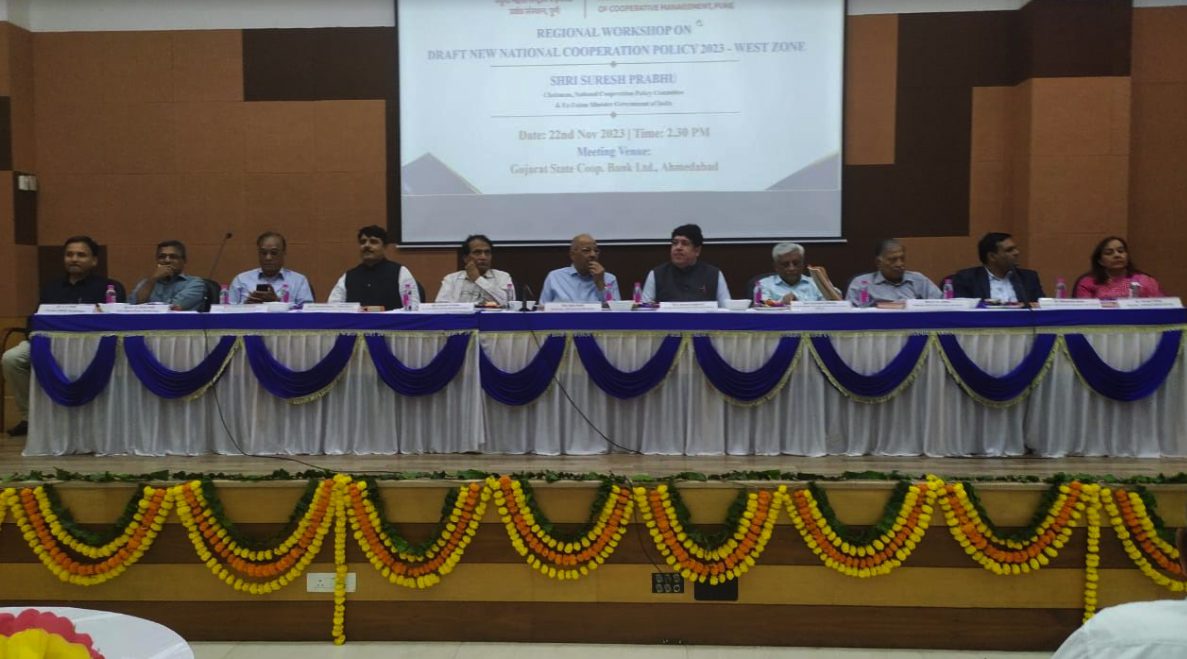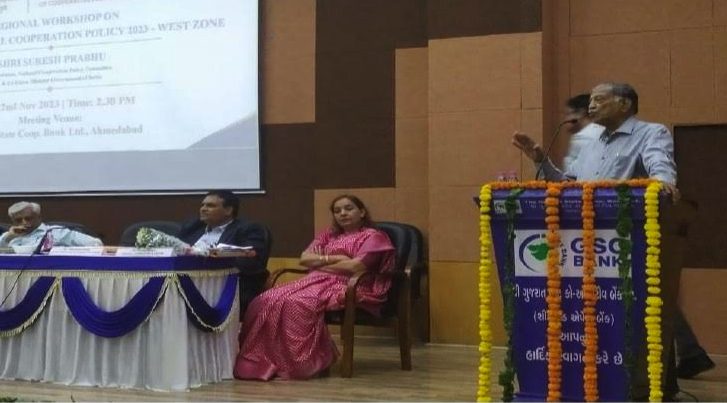By G H Amin
Recently, West Zone Regional Workshop on New National Co-operative Policy-2023 was organised by VAMNICOM -PUNE at Gujarat State Co-operative Bank -Ahmedabad with an aim to give understanding about tentative cooperative policy & invite suggestions and reviews on New National Co-operative Policy documents & conduct healthy discussions on policy matter before finalizing the same.
The occasion was graced by NCP Committee Chairman & Former Central Cabinet Minister Hon’ble Shri Suresh Prabhuji , Speaker of Gujarat State Legislative Assembly Hon’ble Shri Shankar Chaudhary, Deputy Speaker Jethabhai Bharvad ,Chairman of COBI & Gujarat State Co-operative Bank Shri Ajay Patel, Chairman of IFFCO & NCUI Shri Dilip Sanghani , Chairman of NAFCUB Shri Jyotindra Mehta , and myself G H Amin, Chairman of Gujarat State Co-operative Union
Others present included Chairman of NDDB Shri Meenesh Shah, Director of VAMNICOM Shri Hema Yadav, Registrar of Co-operative Society (Gujarat State) Shri K.N Shah and Director of URICM Shri Y.S Patil and other dignitaries. Shri Ghanshyam Amin Chairman of the Gujarat State Co-operative Union and Shri Ajay Patel Chairman of COBI and Gujarat State Co-operative Bank welcomed and felicitated Shri Suresh Prabhuji.
I delivered my speech and presented my views & suggestions on New National Co-operative Policy -2023, which are as follows:
The Co-operative sector is widespread across national as well as international level, currently there are 8.5 lakhs co-operative in all over India with 40 crores members in the same. In the 21st century, majorly 2 sectors are dominant in the economy namely Private Sector and Co-operative Sector.
As the co-operative activity is found at grassroot level, a large number of people are engaged with it in various forms such as elected directors, members of co-operative & employees of co-operative.
Now, as the private sector is gaining support of foreign investments, latest technologies & modern infrastructure. While on the other hand Co-operative is lacking support in all these things. In order to survive against the private sector it is the need of the hour to strengthen & deepen cooperative movement.
80% co-operatives are spread at rural level which lacks modern infrastructure, qualified trainers, latest technology etc. So, in order to strengthen the co-operative movement, we will have to work on the above lacuna & widen the scope of education, training.
As the Hon’ble Prime Minister Shri Narendra Modi is sharing a vision of making India $ 5 trillion economy it is expected from a co-operative sector to make a significant contribution in the same. So, New Co-operative Policy is a guiding path for all of us, the policy has many provisions for training & education but here are my few suggestions to add on the policy document:
1. Co-operatives will strengthen only when they will have modern infrastructure, sound financial position, latest technology, well educated & qualified staff. For bringing professional management in primary society education and training to employees and directors is must and also its essential to create awareness of the co-operative sector among its members, youth & women.
But presently, there is no good infrastructure for training and education in district, state as well as national level. Presently, NCUI,19 ICM ’s, State Co-op Unions & Federations, District Unions, JCTC etc are engaged in giving Co-operative Education & Trainings but the modern infrastructure, latest technological developments, Expert faculties and financial stability are still lacking at their level so, it is required to provide above mentioned facilities.
2. Co-operatives will be required to strengthen its root at village level because if village level co-operatives will be strengthened then only District, State & National level co-operatives will prosper & for the same the training centres must be established at village as well as taluka / block level.
3. I hereby also suggest bringing professional management in co-operatives.
4. There must be a unified syllabus for co-op education and training in all states as well as union territories & valuable degrees should be provided to students in order to encourage them.
5. The certifications of co-operative institutions should be given national value & placements should be provided to students.
6. Looking at the current scenario Democratic Control, Transparency, Accountability are required to be set up in co-operatives.
7. To increase awareness in public regarding the co-operative sector.
8. Co-operative policy must consist of recommendations that the earning co-operative society can easily distribute its profit to their members because until now the members are benefitted by way of dividend only and nothing else.
These are my suggestions for consideration in the New National Cooperative Policy which will help to fulfil the dream of “Sahkar se Samriddhi” of Hon’ble Shri Narendra Modiji and will also lead to strengthen and deepen cooperative movement of nation.






















































